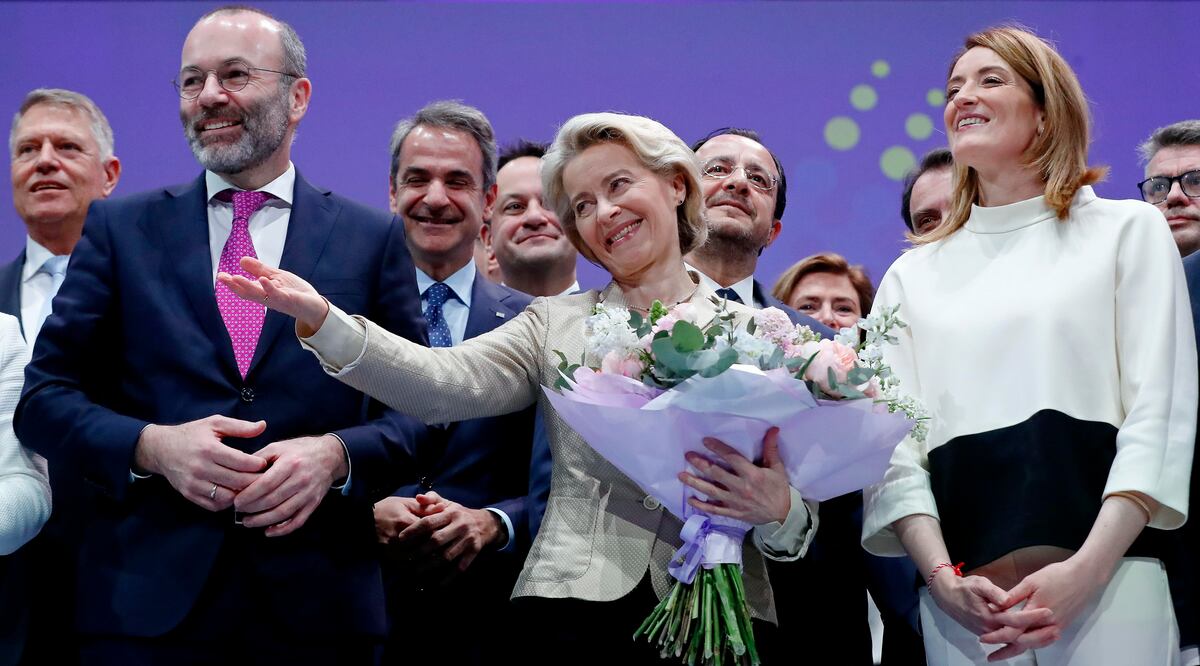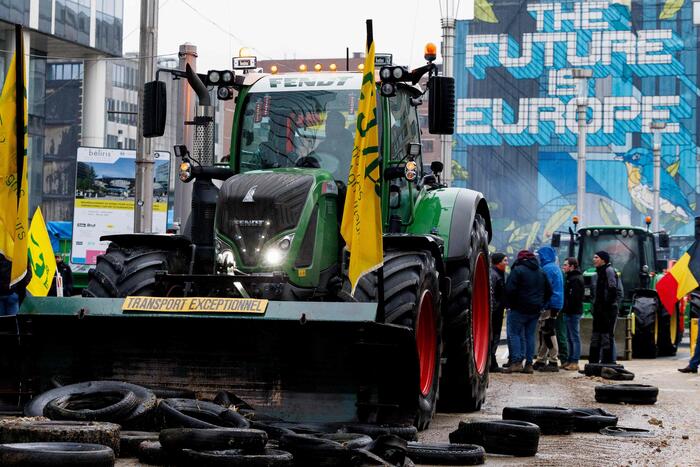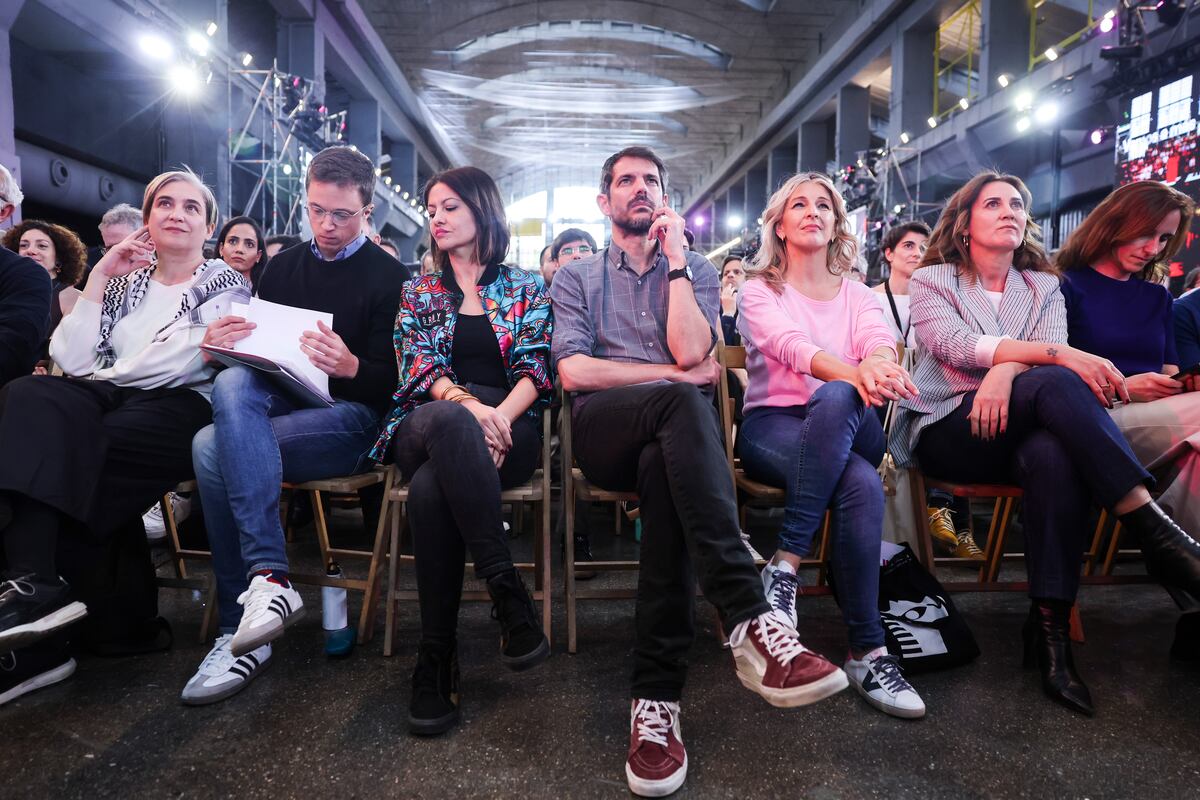The so-called
top jobs
in the EU were occupied just 18 months ago, but some of their incumbents already show a political wear and tear more typical of the end of a mandate than of the first part of a legislature that will end in 2024. The prevailing geopolitical tension and the health and economic crisis caused by the covid-19 pandemic have eroded the president of the European Council, Charles Michel; the President of the European Commission, Ursula von der Leyen, and the High Representative for Foreign Policy, Josep Borrell. The three have also made important political miscalculations and have fought a dull but tough battle for international prominence that has brought them more damage than credibility.
This same Monday, Michel and Von der Leyen will have to settle before the European Parliament the differences that were revealed during their recent visit to Ankara by a suspiciously macho protocol ruling that relegated the President of the Commission without the President of the Council doing anything to prevent it. That clash came a few weeks after Borrell made another disastrous trip in Moscow for the international image of the EU. So far, of the four senior positions elected in 2019, only the president of the European Central Bank (ECB), Christine Lagarde, has emerged almost unscathed from the first year and a half in office, although she has also had some slip.
Lagarde had been in Frankfurt for just over four months when he made the mistake of assuring: "We are not here to curb risk premiums, it is not the role of the ECB."
The phrase abruptly altered the markets in the middle of the outbreak of the pandemic and was interpreted as the end of the Mario Draghi era, marked by the interventionism of the ECB to contain speculative attacks against the euro zone and its most vulnerable members.
Lagarde rectified immediately and since then has established himself in a position where Draghi had set the bar very high.
In favor of the French has played its least public exposure, with little more than one press conference a month and only a handful of media permanently established in Frankfurt.
The rest of the selected quartet had worse luck in 2019. Michel debuted with a budget summit that failed miserably (in February 2020) and his assessment was at a minimum after the clash with Von der Leyen during the meeting with the president Turkish Recep Tayyip Erdogan.
Meanwhile, the president of the Commission suffered her biggest slip at the beginning of this year, with the approval of a draft regulation on export control that put the recently achieved post-Brexit agreement with the United Kingdom in jeopardy.
The German woman backed off immediately.
But the ruling, attributed to the lack of consultation with other commissioners, revealed the shortcomings of a leadership closed in on itself and without the complicity of a good part of the European Commission.
Borrell's biggest hit came in Moscow, during a press conference in which the head of European diplomacy was beaten by a Russian Foreign Minister, Sergey Lavrov, who took advantage of the lack of preparation for the trip by the European delegation. Community sources believe that the Spanish has not yet recovered from that shock and has aggravated the image problems of a vice president who since his arrival in Brussels has not managed to consolidate himself as a heavyweight within the community framework.
Sources consulted in Brussels acknowledge that the current leadership of the EU has faced a geopolitical and economic situation of a difficulty with few precedents.
The tremendous health and social impact of the pandemic has been compounded by growing tension with Vladimir Putin's Russia and continuous friction with Erdogan's Turkey.
Only the end of the Donald Trump era and the rapid arrival of COVID-19 vaccines has offered some relief to community leaders.
More information
Bagpipes and sofa
Charles Michel, the leader marked for not giving up his chair to Ursula von der Leyen
It is also pointed out in Brussels that some of the setbacks have been due to the complexity of the EU itself, with overlapping structures and powers that are not always well defined. But there is no shortage of people who blame the problems on a selection system for senior positions that, for the sake of consensus, sometimes renounces the most appropriate appointments and settles for the least uncomfortable profiles.
The Union does not have one PAYG director, but 27, as many as Heads of State or Government sit in the European Council. That was the forum from which the current community leadership was elected after a very long European summit (in July 2019) that reached the four names on the basis of discarding the first options on the table. Balances of gender, political color, and nationality completed the criteria for bargaining and concessions fitting the four pieces of the community puzzle together.
Iratxe García MEP, leader of the socialist group in the European Parliament, believes that "there was no
casting
problem
, all the people elected have a great capacity for work and analysis." But on the way there were initial bets for the presidency of the Commission such as the MEP and leader of the popular group (PPE), Manfred Weber; or the socialist Frans Timmermans and the liberal Margrethe Vestager, both with five years of experience in the European Commission. All three had been head of the list of their respective formations in the elections to the European Parliament, won by Weber's EPP. But they were rejected by a good part of the Council.
The haggling for the other posts also eliminated Michel Barnier, a successful European Brexit negotiator, Kristalina Georgieva, eventually repositioned at the head of the International Monetary Fund, or the president of the Bundesbank, Jens Wiedmann, who remains in charge of the German central bank.
"In the end, it was decided to have a weaker Commission by putting Von der Leyen in front, whose political weight at that time was limited," diagnoses Ernest Urtasun, MEP from the Green group.
Urtasun believes that to this is added "a structural problem, with two presidencies, the Council and the Commission, sometimes competing to occupy the same space."
Belgian diplomat François Roux, who was Michel's chief of staff during the first months of his mandate, believes that the so-called
sofagate
has brutally exposed internal differences in the EU regarding foreign relations. "The diplomatic incident in Ankara [Von der Leyen was relegated to a couch, at another level than Michel and Erdogan] has damaged the credibility of both presidents and also of the EU," concludes Roux, now a member of the Egmon Institute think tank, in an analysis published last week.
But the rivalry between the Belgian and the German seems to go beyond a mere conflict of competence and the incident around the Ankara chair has revealed an ill will that has surprised in Brussels. The sexist tint of the clash between Michel and Von der Leyen has further complicated the search for a negotiated solution.
Iratxe García has defended that in the parliamentary debate on Monday the analysis of the relationship with Turkey was separated from the incident between Michel and Von der Leyen, to highlight the sexist nature of the
sofagate
. But popular, liberal and green have closed ranks to merge both issues and avoid Michel an uncomfortable scuffle about his attitude during the meeting with Erdogan. "The Treaty is not going to change so Michel and Von der Leyen will have to turn the page and learn to live together," ditch a diplomatic source from one of the most populated countries in the Union.
The accumulation of friction and setbacks has led to an accelerated deterioration of the EU leadership.
Michel is the one in a more delicate position because his initial mandate is two and a half years and he needs the approval of the European Council, by a qualified majority, to complete the five years of the legislature.
Von der Leyen in principle is guaranteed the position until 2024, unless the European Parliament opted for a vote of no confidence, something unthinkable at the moment.
Borrell also has practically armored his mandate as Vice-President of the Commission, although his position as High Representative can be revoked by the Council by a qualified majority.
But all three still have ample room to claim their work in Brussels. Michel is credited with last year's historic agreement on the pandemic recovery fund. Von der Leyen has been at the forefront of vaccination campaigns that after the initial rattles have already achieved a significant cruising speed. Borrell, for his part, appears on the verge of resuscitating the nuclear deal with Iran after Trump's departure from the White House.







